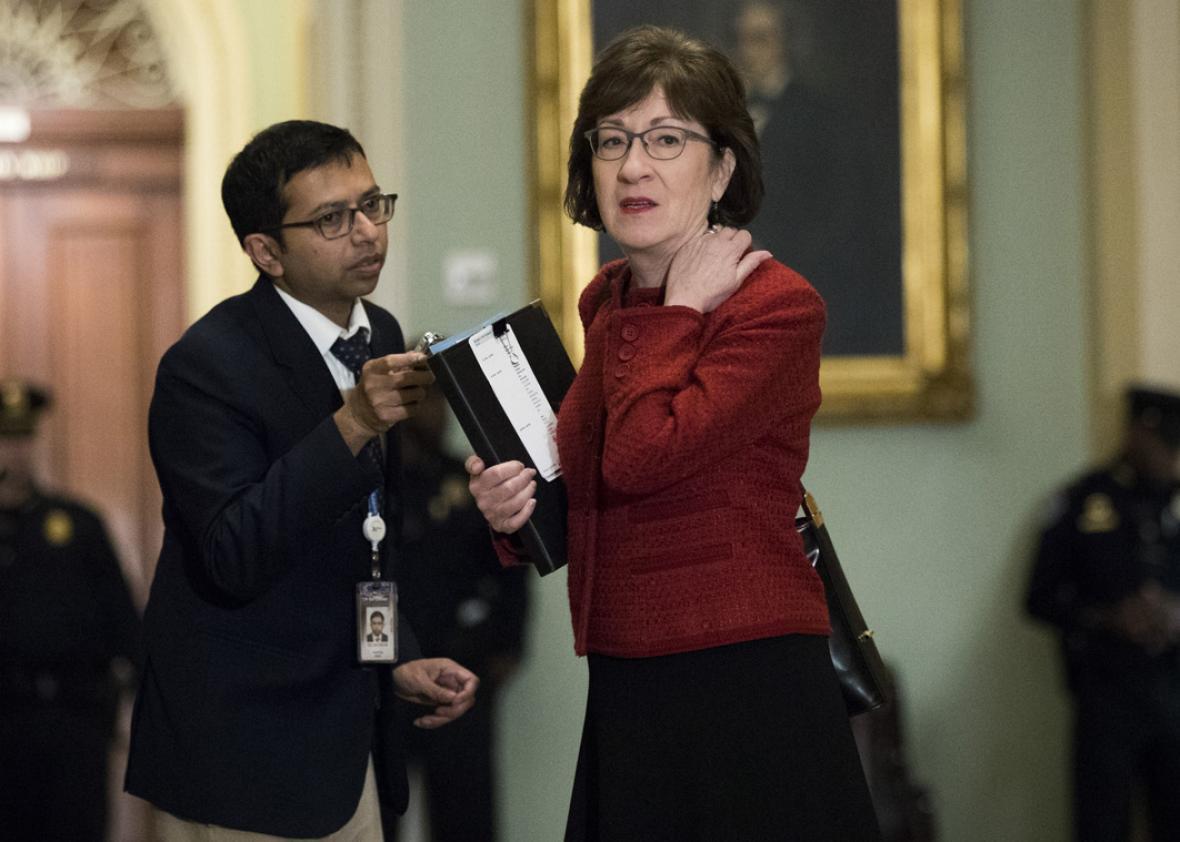Maine Sen. Susan Collins has not been pleased with the Capitol press corps lately. In recent days the mild-mannered senator has cut off reporters or told them how tired she is of their “cynicism.” On Tuesday, when she was asked for the umpteenth time about her confidence that two health care bills she supports would become law by the end of the year, she unloaded.
“I believe that the coverage has been unbelievably sexist, and I cannot believe that the press would have treated another senator with 20 years of experience as they have treated me,” she told reporters, pointing to a New York Times story that initially made reference to whether she cried in a meeting with activists. “They have ignored everything that I’ve gotten and written story after story about how I’m duped. How am I duped when all your amendments get accepted?”
Collins has a point about her effect on the bill. At her insistence, the Senate included a provision in the Republican tax bill that keeps property tax deductibility up to $10,000. She secured a temporary enhancement of the medical expense deduction for two years—a deduction that the House bill had eliminated. She was also able to preserve catch-up contributions to retirement accounts for church, charity, school, and public employees. The estate tax was not repealed in the bill, another of her conditions.
But pointing to these accomplishments when asked legitimate questions about the fate of the health care bills is a deflection.
In negotiating her support for the tax bill, Collins secured a commitment from Senate Majority Leader Mitch McConnell to pass two health care related bills: the Alexander–Murray stabilization bill, and a separate reinsurance bill that Collins co-authored with Florida Sen. Bill Nelson. McConnell, in a Dec. 1 exchange with Collins on the Senate floor, pledged his support for passing both bills “ideally prior to the adoption of any final tax reform conference agreement and certainly before the end of this year.” Collins also claimed that she had earned the Trump administration’s backing for the two bills, which “would be considered and signed into law before the conference report on the tax bill comes back.”
The missing link in Collins’ story has always been the House of Representatives. What commitment, if any, had she received from Speaker Paul Ryan that he would be able to usher these bills—which much of the House Republican conference considers Obamacare “bailouts”—through the chamber? If she knew something about the strategy for moving the bills through the House, she wouldn’t share it. Instead, she would only reiterate her belief that the agreement would be upheld.
“The commitment that I have is that Alexander–Murray and Collins–Nelson will be finished before the end of the year,” Collins told reporters on Dec. 12, when asked whether the two bills would need to be attached to the Dec. 22 government funding bill. “What vehicle is up to the leaders to decide, and exactly how that unfolds, but I do expect that the commitment that it will be passed by the end of the year will be kept.”
Eight days later, and it’s now official that neither health care bill will become law by the end of the year.
There was widespread anger among House Republicans at the idea of passing Alexander–Murray in the Dec. 22 spending bill. And Democrats lost interest in Alexander–Murray once Republicans repealed the individual mandate. Washington Sen. Patty Murray, the Democratic co-author, didn’t appreciate Republicans using her compromise as a bargaining chip in the tax debate, and it’s not even clear that Alexander–Murray would help at all with the individual mandate repeal. Facing certain defeat ahead of the next short-term spending bill, Collins and Alexander released a joint statement on Wednesday announcing they will punt on both this and the reinsurance bill until January.
And so we now have the answer to the question that angered Collins: Neither Alexander–Murray nor Collins–Nelson will become law by the end of the year despite her high degree of confidence that would be the case. Maybe these bills will be attached to the January package. Or maybe they will disappear into the wind.
When Collins voted against several iterations of repealing-and-replacing Obamacare earlier this year, activists greeted her as a hero. Now that she has voted for a tax bill that, among other things, gashes the Affordable Care Act and will lead to serious premium increases for people with pre-existing conditions, those same activists are treating her as a villain. The press is both questioning her consistency on health care issues and following up on the durability of the handshake agreements she reached—which haven’t proven to be as durable as she consistently made them out to be. It’s a turn of events that a savvy senator with 20 years of experience should expect.
